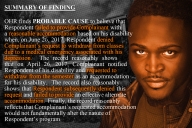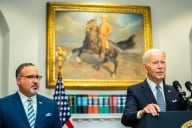You have /5 articles left.
Sign up for a free account or log in.
The Trump administration published a final rule Monday making it harder for immigrants who have received certain public benefits such as food stamps, most forms of Medicaid and housing assistance to obtain permanent resident status. The rules outline criteria the Department of Homeland Security will use in denying applications for admission to the United States or adjustments of immigration status for individuals who are already living here and are deemed “likely to become a public charge” in the future.
Opponents of the rule say it constitutes an attempt to circumvent Congress to reduce legal immigration levels by providing expansive new grounds on which DHS and consular officials at the Department of State can deny applications for immigration petitions and visas, respectively. Higher ed experts and college administrators say the rule could have a chilling effect on immigrant students accessing benefits for which they're eligible and could deter foreign students from coming to study here.
The Trump administration argues that the new rule will enforce a law that’s long been on the books, specifically, a provision of the Immigration and Nationality Act deeming immigrants inadmissible if they are likely to become a “public charge.”
In the past, officials have defined “public charge” narrowly to apply to individuals who are “primarily dependent on the government for subsistence, as demonstrated by either the receipt of public cash assistance for income maintenance or institutionalization for long-term care at government expense.”
The new rule expands the types of government benefits that are taken into consideration to include certain noncash benefits. It also identifies a series of factors -- including age, health, household size, income, assets, debts and education and skill levels -- officials will use in making forward-looking judgments about whether would-be immigrants are likely to need public assistance in the future.
“Through the public charge rule, President Trump’s administration is reinforcing the ideals of self-sufficiency and personal responsibility, ensuring that immigrants are able to support themselves and become successful here in America,” Kenneth T. Cuccinelli II, the acting director of U.S. Citizenship and Immigration Services, said at a news conference Monday. “Our rule generally prevents aliens who are likely to be a public charge from coming to the United States or remaining here and getting a green card.” (By "green card" he was referring to the official identification card that denotes an immigrant as a legal permanent resident. Older versions of the card used to be green in color.)
The effects of the rule -- which is scheduled to go into effect Oct. 15 -- will stretch far beyond higher education, but advocates for immigrant students say they will be among those affected.
"By the targeting of the public benefits, especially SNAP [the Supplemental Nutrition Assistance Program] and housing assistance, it’s going directly at benefits that help support student success," said Miriam Feldblum, the executive director of the Presidents' Alliance on Higher Education and Immigration.
The rule does not include Pell Grants and other forms of educational assistance among the types of benefits that immigrants will be penalized for receiving. But higher education groups previously expressed concern that confusion over the question of what benefits would and would not count against them would discourage some immigrant students from applying for Pell or other federal financial aid.
Higher education groups have also expressed concerns about the implications for international students and scholars on nonimmigrant visas. International students already have to demonstrate that they have funds to pay for tuition and living costs as part of their visa applications.
"At the time of the application for a nonimmigrant visa, the alien must demonstrate to [the Department of State] that he or she is not likely at any time in the future to become a public charge," DHS said in its answer to a public comment on the topic of international students. "Similarly, at the time a nonimmigrant applies for admission, he or she must demonstrate to [Customs and Border Protection] that he or she is not likely at any time in the future to become a public charge."
The agency's response further says that nonimmigrant applicants will not need to demonstrate that they are not likely to become a public charge "when seeking an extension of stay or change of status as a nonimmigrant student or nonimmigrant exchange visitor … However, the alien will need to demonstrate that he or she has sufficient funds to pay tuition and related costs as part of the application for extension of stay or change of status to a nonimmigrant. Further, the alien must demonstrate that he or she has not received, since obtaining the nonimmigrant status he or she seeks to extend or change and through the time of filing and adjudication, one or more public benefits as defined in the rule, for more than 12 months in the aggregate within any 36-month period."
"It's setting up a whole new set of hurdles," said Doug Rand, who worked on immigration policy as the assistant director of entrepreneurship in the Obama White House and is now the co-founder of Boundless Immigration, a company that helps immigrants apply for green cards or U.S. citizenship. "Will students be disproportionately affected relative to other groups? Maybe not: it's probably going to be easier for young students to clear these hurdles than elderly non-English-speaking parents of U.S. citizens, for example, but I wouldn’t get smug about that if I were higher ed. The clear intent of this policy is to make it harder for people to come here, and this administration backs that up with policies and rhetoric that have already depressed international student enrollment."
"Imagine what’s going to happen if this rule goes into effect and we are truly setting the welcome mat on fire to legal immigrants, and saying we’re unleashing the State Department to deny you a student visa based on some arbitrary prediction of whether you’ll ever need public benefits," Rand added. (Although the new rule was promulgated by DHS and does not directly change State Department policies, a footnote states that "DHS is working with DOS to ensure that the Foreign Affairs Manual" -- a compendium of State Department policies and procedures -- "appropriately reflects the standards in this rule.")
Janet Napolitano, president of the University of California system and a former DHS secretary under President Obama, also said that the rule change would have a negative impact on the perceptions of potential foreign students considering studying here.
"Today’s decision by the Trump administration to expand the definition of ‘public charge’ sends a detrimental message internationally -- that the United States does not want other countries to send their best and brightest here to study and add to the intellectual exchange at our universities, to conduct important research and to contribute substantially to our economy, among other things," she said in a statement.
"This rule also means that a number of UC students and other California residents, out of an abundance of caution, may be reluctant to seek available assistance such as preventative health care, housing opportunities and nutrition education and benefits," Napolitano continued.
"The bottom line: the decision today penalizes and chills much-needed access to vital benefits for which lawful immigrants or mixed-status families are eligible, and not only leads to harmful, unintended consequences but also raises questions about the true intent behind the federal government’s unnecessary and misguided action."








